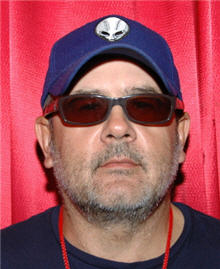Singularity Summit 2007: The view from never, never land

Guest post: This weekend I am at the Singularity Summit 2007 in San Francisco at the Palace of Fine Arts. About 800 people showed up to hear about the issues related to a future in which humans won't be the driving force in delivering scientific and technological innovations, eclipsed cognitively by "posthumans" or machine intelligences. I talked to four of the speakers prior to the event--the podcasts are here.

Having listened to the CEO of Artificial Development, Marcos Guillen, describe the painstaking methods his company uses to try and make simulated brains, there was only one thing one could think.
Never. Never would it be possible to copy your head or my head. And therefore certainly not that of Robin Williams.
And, as if some artificial intelligence had created an agenda that was designed to prove me wrong, or, perhaps, right, Jamais Cascio took to the stage.
For those of you who still prefer to refer to the slivers of fatted potato you eat with your Veggie Big Macs as "freedom fries," jamais is French for never.
It is not for me to wonder why someone would choose to name their child never. Although if you could see inside my cortex (which was specially designed for me by those fine folks at Artificial Development) you would see that my inner head is telling me that perhaps Jamais was a surprise.
“ I have just given birth to a son.” “ Never!”
However, Jamais, Mr. Never, is desperate for those who are Singularity-focused, to adhere to a certain always.
Always be open. Always be transparent. Because the only way the Singularity Project can be one of hope rather than despair or control, is if everyone involved confesses to their biases upfront.
If everyone embraces the concept that the knowledge and tools used to create man and machine in perfect harmony are available to everyone, then we might be able to trust the intentions of any robot that offers to make us tea, coffee or laugh.
Of course, the problems he is confronting are the very same problems that Tom Cruise confronts whenever he tried to make yet another brilliantly-conceived movie.
Politics, egos and money.
Mr. Cascio says the greatest fear is if the only people in the know about the new intelligence are the people gathered here today in the Palace of Fine Arts.
I look around me and am forced to agree. In the audience is a man wearing a large zebra-patterned cowboy hat. If he were in control of our future robots, what effect might that have on, for example, fashion? Or Houston? To my left is a bald man with a massive blond pigtail. Perhaps he owns a Harley-Davidson, perhaps not. But if he happened to design an AI that would be the hairdresser, the vehicle-designer, or perhaps even the sex-change surgeon of the future, then I would be extremely concerned.
The view from Mr. Never’s Land is that, akin to the Human Genome Project, everyone has to work for the common good.
That has never happened in Hollywood. How can we hope that it will happen with brains (and, so rumor has it) egos that are even larger than those of Jack Nicholson and The Rock?
Perhaps, then, everyone involved should join a church, a sect, where they make solemn promises to work for humankind. We know there are certain problems with the concept of Do No Evil. But if it were a church and not a corporate entity, perhaps the result would be different.
It should be a church in which science and ontology merge for the good. We need a word that brings it all together.
How about Sciontology?
Nah, some egomaniac would come out and sue us, wouldn’t they?